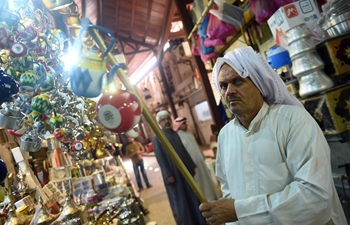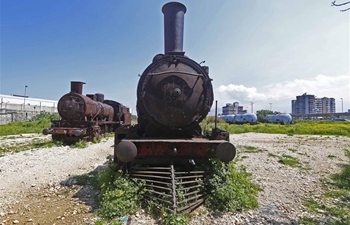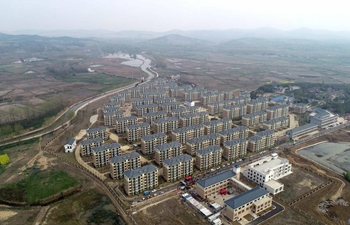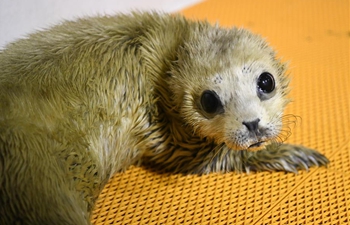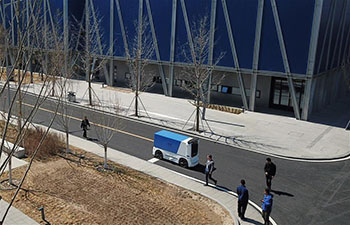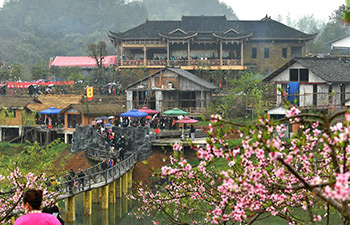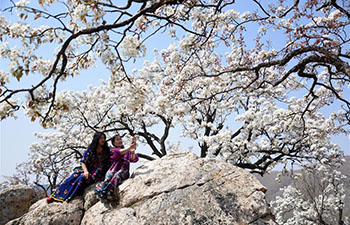
Photo taken on April 4, 2019 shows a scene of a cemetery for Chinese martyrs in Vietnam's northern province of Thai Nguyen. Here in a cemetery in Linh Son commune, Thai Nguyen city, Thai Nguyen province, about 80 km from downtown Hanoi, Vietnam, 139 Chinese martyrs lay resting in eternal peace. (Xinhua/Wang Di)
THAI NGUYEN, Vietnam, April 4 (Xinhua) -- Here in a cemetery in Linh Son commune, Thai Nguyen city, Thai Nguyen province, about 80 km from downtown Hanoi, Vietnam, 139 Chinese martyrs lay resting in eternal peace.
Their graves, built from dark red granite, lie on a windy hill, in the shade of pine trees.
In front of the monument with red inscription reading, "Everlasting remembrance of martyrs", a group of around 50 people simultaneously bowed their heads in silence on Thursday morning.
Dressed mostly in black and white, representatives of the Chinese embassy in Vietnam, Chinese enterprises, students and media workers, led by Chinese Ambassador to Vietnam Xiong Bo, accompanied by representatives from the Vietnam-China Friendship Association, local officials and young volunteers, stepped upward in sequence.
They offered incense at the memorial ceremony on the occasion of Tomb Sweeping Day, or Qingming Festival.
In the latter part of the 20th century, upon the request of the Communist Party of Vietnam and Vietnamese people, more than 320,000 Chinese troops joined Vietnamese people in their fight defending the country's independence, according to the embassy.
After the war, more than 1,400 Chinese martyrs who fell down in the fighting were laid to rest in 40 cemeteries in 19 provinces across Vietnam.
Nguyen Thi Van, 74, who has been a custodian at the cemetery for over 30 years, emotionally recalled, "I took over the work from my husband when he died in 1988. After so many years, still I cannot help crying with the martyrs' families whenever they make a visit. It's noble to die for others' happiness."
Van said she always takes care of the tombs with gratitude. As she is now getting older and older, her daughter-in-law and two grandchildren help her with daily cleaning.
"My family have been here for generations, my parents, I and then my children, who grow up playing around here. It's most likely that I will take over the work when my mother-in-law can no longer do it," Do Thi Hong, 36, the custodian's daughter-in-law, told Xinhua amid smoke of the burning incense.
Local authorities always attach importance to taking care of Chinese martyrs' tombs.
"Those fallen heroes sacrificed themselves here in Vietnam for our country's independence, for the world peace. Taking care of their tombs is a way we show our appreciation and respect for what they did," said Vu Xuan Hung, vice chairman of the People's Committee of Linh Son commune.
Hung said the local authorities at commune, district and city levels usually organize visits to pay tribute to the fallen heroes. They offer incense, check the cleaning work and regularly plan upgrades at the cemetery on such occasions as Lunar New Year Festival and Vietnam's War Invalids and Martyrs' Day (July 27).
"They sacrificed their youth and their lives to build an immortal monument of friendship and solidarity between the two countries and the two peoples," Xiong Bo said, affirming that the heroes will never be forgotten.
The China-Vietnam relationship has reached a new historic point and the two peoples will join hands to strengthen ties in a sustainable way, said Xiong.

